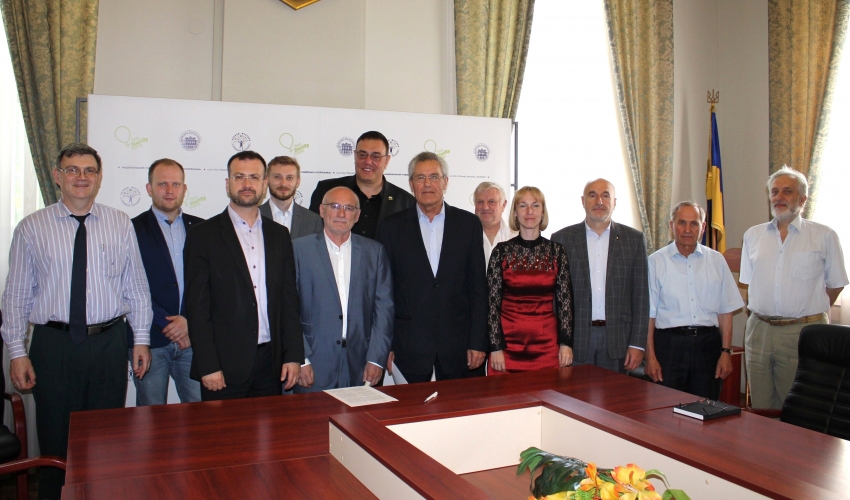
Some days ago, Ericsson, a world famous company, and Lviv Polytechnic National Umiversity signed an association agreement. Before signing the agreement, Professor Oleh Matviykiv, Vice-Rector for Education and International Relations, made a presentation of the University research schools in English. Academics from the Institute of Telecommunications, Radioelectronics and Electronic Engineering as well as from the Institute of Computer Sciences and Information Technologies also presented the directions in which they work.
Andrew Shomahiya, Director General of Ericsson Ukraine, Sinisha Krainovic, Ericsson mobile networks development centre head, and Orest Kossak, head of Ericsson R&D centre in Lviv, came to attend the ceremony of signing the agreement.
The document was signed by Professor Yuriy Bobalo, Lviv Polytechnic Rector, and Orest Kossak, head of Ericsson R&D centre in Lviv.
Ericsson is a world leader in the field of telecommunications. Its main business work is aimed at introducing new technologies in the field of mobile communication, cloud technologies, IT, media and Internet of Things. It was founded in 1876, and its office in Ukraine was opened in 1995.
Guests of honour, namely Orest Kossk, stressed that the company is first and foremost interested in research and development co-operation with the University academics and it relies on Lviv Polytechnic professors and lecturers, their determination to work with innovative technologies. Ericsson representatives suggested finding a common ground in this type of co-operation.
Suggestions have already made by different departments. Professor Nataliya Shakhovska, Deputy Director of the Institute of Computer Sciences and Information Technologies, thinks that the company can be interested in the developments of the Institute in the field of big data processing and machine learning. Professor Mykhaylo Lobur, Head of the Department of Computer-Aided Design of the Institute of Computer Sciences and Information Technologies, has suggested co-operation in the field of creating a «smart house», a «smart street», a «smart city» as well as developing Ericsson mobile telephones applications.
As far as the co-operation between Ericsson and Lviv Polytechnic is concerned, it has been the longest with the academics at the Department of Telecommunications of the Institute of Telecommunications, Radioelectronics and Electronic Engineering. That is why, after the agreement had been signed, University Press Service reporter talked to Bohdan Strykhalyuk, associate professor of this department.
– A few words about the recent history. Education and research co-operation with Ericpol (its Lviv Office purchased and integrated Ericsson) began in 2012 and lasted for three years. We developed a joint education program. Every year, 6 students pursuing their Master’s degree had internship there. Three students per semester received company scholarships. Three graduates of our department were employed by Ericpol. Ivan Demydov, our lecturer was trained there. Apart from this, at the company laboratory base in Lviv, nearly 60 students had an opportunity to have practical classes. We have courses adapted to their tasks. We are interested in creating a joint laboratory, where their teachers-instructors and our academics could work with our students.
– Mr Strykhalyuk, Orest Kossak did not reject to renew education co-operation, but he stressed joint research and development work. What can your department offer to the company?
– We can develop our co-operation in three main directions. This is so called machine-to-machine interaction technology (М2М), this is 5G technology – we are developing fifth generation of mobile communication, and also IoT – Internet of Things. Two dissertations have been defended on the problems of IoT. Apart from this, we have a complete development in optic communications. It includes the device itself, its structure, routing algorithms. One candidate and one doctoral dissertation on this problem have been defended. Two of our academics defended their candidate dissertations in program configured networks.
– Let us not speak in detail about the applied significance of all these developments. However, tell us about the aim of machine-to-machine interaction.
– It is about machine-to-machine exchange for short or very short distances with the help of sensors-detectors. Ericsson is interested in exchange between separate machine parts. It doesn’t have to be about vehicles. It can be about big industrial machines. For them, machine-machine exchange is good to obtain information on their technical condition, to make quick decisions about technical support – without human interference in this process. The company would like to enter the automobile market with the solution to the problem of additional navigation to avoid accidents. And this can be part of such concepts as «smart street», «smart city» etc.
One of our academics is being trained in South Korea now. He is working on the problem of data transmitting for short and very short distances between sensors-detectors with the help of radio communication.
I hope our co-operation, provided we move towards each other, will be beneficial for the company and will bring our students and our academics closer to the real demands of the telecommunication services market.







